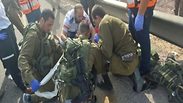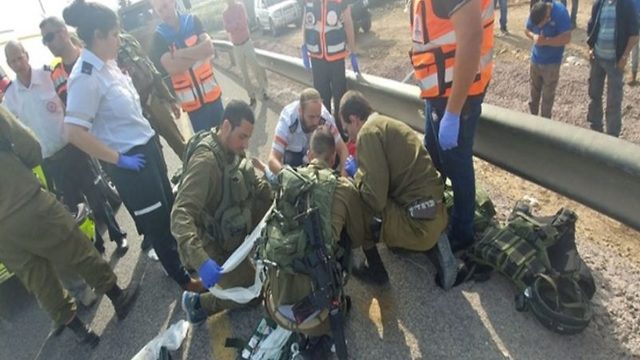

Saving lives in volatile territory: The IDF’s West Bank medical unit
Rarely making the news, the IDF's medical personnel save both Israeli and Palestinian lives in the West Bank; with over 2,000 people treated so far this year, half of them Palestinians, the unit tends to everything from car accidents to terror attacks.
“We are on-call 24 hours a day, seven days a week,” Dachtman told The Media Line. “If there is a civilian with a heart attack, if there’s a terror attack, we are always in a state of readiness. It is quite a hard life for medical personnel to serve here, but it is very fulfilling. It’s very fulfilling.”
Dachtman is based at the headquarters of the IDF’s Judea & Samaria Division, from where he oversees approximately 100 personnel, spread out across six regional brigades, each one located in the vicinity of a major Palestinian city. Together, the team is responsible for all emergency medical services in the 3,000 square kilometer region.
The IDF crew responds to an average of three calls per day, coordinating its activities with the Israeli Magen David Adom and Palestinian Red Crescent health services. The crises range from a Jewish woman with labor complications to a Palestinian Muslim cancer patient requiring transportation to an Israeli facility for treatment.
“The number one casualty maker in the Judea and Samaria area is car accidents by far,” Dachtman said, as we approached the Rehilim juncture, where there is generally at least one fatal crash each month.
“We have a few spikes every year,” he continued, “especially during Ramadan,” the Islamic holy month when Muslims fast from sunrise to sundown. “This is because they do not eat or drive during the day, but at night they start their lives and some drive very recklessly, I’m sorry to say.
“Of course,” Dachtman expounded, “when there is an accident we do not ask questions or point blame. We are here to ensure that the wounded receive the best possible care.”
Already this year some 2,000 people—about half of them Palestinian—have been treated by the Israeli army.
Instinctively, I asked Dachtman how Palestinians react to being helped by what many of them view as the “enemy.” It quickly became apparent, though, that the topic was off-limits, too sensitive to venture down that road given the longstanding political and security tensions.
“There is coordination” was about all I extracted out of him, while nevertheless getting the impression that below the surface ties may run deep.
Dachtman did share one particular episode that has stuck with him, recalling how a Palestinian construction worker fell six stories from a structure and sustained a major head wound. The IDF called in an aircraft to evacuate the man.
“So we have a Palestinian worker, taken to an Israeli hospital, by (IDF) soldiers,” Dachtman noted. “It’s nice, no?”
Shoval Golan is an Israeli paramedic who provided me with a first-hand view into a day in her life.
“I take care of Jews, soldiers, everybody, children and adults of all ages. We have all that is needed to treat people in the field,” she told The Media Line, adding that “most of our patients are Palestinian.”
Golan proceeded to show me the insides of one the IDF’s new ambulances, replete with state-of-the-art equipment, resembling a mobile trauma center. “It has most everything that a hospital does,” she explained, while placing particular emphasis on a bottled liquid that in seven minutes can be transformed into the temporary equivalent of human plasma.
Few, if any, stories of Israeli-Palestinian cooperation are ever told, and this one goes firmly against the grain. The sides are not harming each other, but, rather, working in tandem to do the exact opposite.
One small deed for man, repeated enough times over, may be the key to achieving a giant step towards healing the divisions that have long plagued this otherwise beautiful place.
Article written by Charles Bybelezer
Reprinted with permission from The Media Line
















